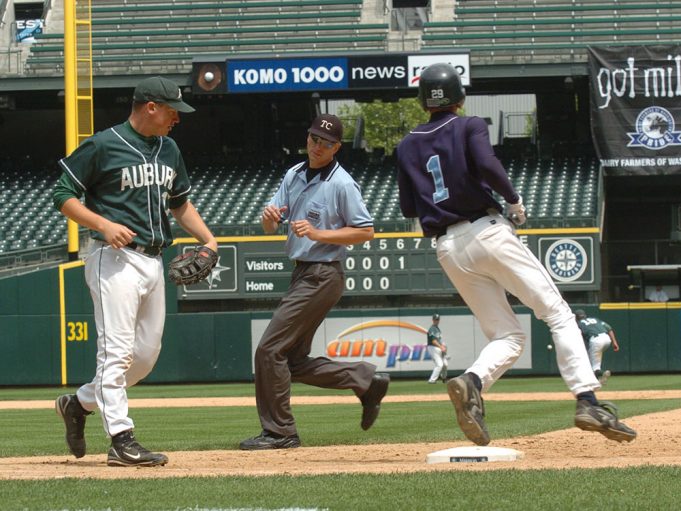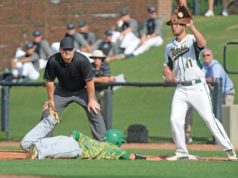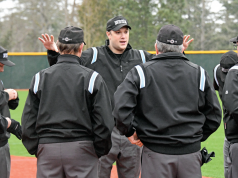Consider the top umpires at any level. What mindset do they have? How do they get it? For me, the key ingredients for the kind of mindset that allows us to work our best games are confidence — for which solid preparation is vital — tempered by humility.
When we first set foot on the field to work a game, we must know that we’ve done our homework. We know we’re going to miss a pitch or play here or there; indeed, I was still kicking them two years ago when I retired after 50 years of umpiring. If we’re new to umpiring, we may also know that we’ve not yet mastered the rules, mechanics and people/communication skills that will enable us to deal with the myriad things than can occur. We also don’t yet have the credibility that will enable our decisions to be accepted as readily as they would be if we had more seasoning.
But we can only turn in the best performance that our skill set allows if we’ve prepared as fully as we can. Only then can we have the confidence to sit back and let the pitches and plays come to us. It’s no different with us than it is with teams and players; careful and thorough preparation by everyone, from the coaching staff on down, is the key to top-level individual and team performances.
In 1993 I learned that I was a finalist for the NFL officiating staff. Overjoyed, I entered that baseball season without having seen a pitch in scrimmages. Having never been one of those umpires who can strap it on with no scrimmage work and be nearly flawless, I always worked three or four scrimmages before the season started.
Not this time. I thought I could bank on the fact that I had been umpiring at the professional and collegiate levels for more than 20 years, so it would be like riding a bike. My first game was a plate job for the University of Texas vs. Stanford. To be generous, I stunk. I probably missed 15-20 pitches. I survived because I had a good track record with the coaches, but I vowed I would never again start the season without scrimmage preparation. I simply wasn’t ready to make the fine distinctions between pitches in and just out of the zone that are the hallmark of a top umpire and to do so consistently for nine innings.
While confidence is essential, we can’t get to the point where our chests are puffed out and we think we’ve achieved perfection. That’s a recipe for disaster. Not only is it off-putting to coaches, players and our partners, but it can cause us to at least subconsciously think we don’t need to put forth 100 percent effort.
After four years of pro umpiring, I quit in 1973 and started a college career. I had done well in the pros and, frankly, thought college ball would be a lark. But I had a couple of games in which it seemed I couldn’t get anything right. I asked a respected veteran what he thought was going on and he said, “Son, have a little humility. None of us are as good as we think we are.”
Stay off your high horse
I thought about that many times afterward. What he meant was I was coming across like I thought I was above this level of ball. I was just going through the motions, with a cocky attitude, and now I was (deservedly) getting kicked in the backside. From then on, I recognized that no matter who you are or what you’ve done, you must stay off your high horse and always give 100 percent effort.
Part of good preparation is constant rules study — not just in the month before the season starts, but year round. I don’t mean merely reading the book; instead, I mean reading a rule, stopping, mulling over its intent and visualizing play situations that would require its application. There’s a difference between reading and studying, and only the latter gets us where we need to be.
It’s the same with the mechanics book. You may know the basics, but if you don’t consistently spend time studying, you’ll forget the nuances. Somewhere down the line you’ll suffer by being in the wrong position to evaluate a play or you’ll hurt your crew by not being where you’re supposed to be after the ball is hit.
Top-notch umpires stay in shape all year. They don’t put on 20 pounds from June through January and then starve three weeks before the season starts. And they don’t try to do hard running after being a couch potato for months, for that’s a sure-fire way to come up lame, especially as we age.
How about video work? It’s a staple for football officials, many of whom are “film junkies,” but baseball umpires tend not to think about it. A lot can be gained from dissecting films. How did the crew rotate? Were the calling umpires positioned correctly? What about the plate umpire’s stance, height, movement, timing, etc.? If something came up that required communication skills, did they seem present? If you can’t get video of your games, there are a ton of college and professional games on TV and the internet.
What’s the mindset of a successful umpire? If I’ve stayed on top of everything previously covered — and do so 12 months of the year — I’ll go into and through the season confident that I’m as equipped as I possibly can be to do well. But if I’ve fallen short or waited until the last second to try to get up to speed, I’ll know in the back of my mind that I’m not ready to work, and that will increase the chances of failure. A bad game or two and I’ll start losing my confidence, and then things may snowball. Get in a bad rut and it can be hell getting out.
What's Your Call? Leave a Comment:
Note: This article is archival in nature. Rules, interpretations, mechanics, philosophies and other information may or may not be correct for the current year.
This article is the copyright of ©Referee Enterprises, Inc., and may not be republished in whole or in part online, in print or in any capacity without expressed written permission from Referee. The article is made available for educational use by individuals.


















